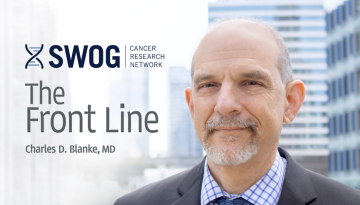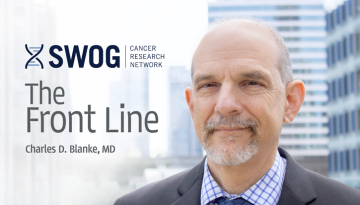Broadening Eligibility Criteria, Round Two
Five years ago, ASCO and Friends of Cancer Research teamed up to study and change cancer clinical trial eligibility criteria. They brought together experts from across the healthcare sector to see how studies could open up to more patients, while maintaining the strictest safety standards.
The discussion remains critical to our work. Overly restrictive trial eligibility can reduce patient access, drive down accrual rates, and limit the ability to generalize trial results to the broader population of patients who will ultimately get the treatment or prevention strategy studied.
ASCO and Friends released in their first round recommendations for eligibility criteria regarding brain metastases, HIV/AIDS, organ dysfunction, prior and concurrent malignancies, and minimum age for enrollment. These recommendations were submitted to the U.S. Food and Drug Administration as guidance documents, and in 2018 the National Cancer Institute used the recommendations to create new templates for treatment trials for SWOG and other members of its National Clinical Trials Network, a development which I reported on here.
Now it’s Round Two.
This year, ASCO and Friends issued recommendations to address five additional areas: treatment washout periods, concomitant medications, prior therapies, laboratory reference ranges and test intervals, and patient performance status. They’re detailed in articles published in the AACR journal Clinical Cancer Research. Get the links, and read the ASCO/Friends statement, by visiting here.
To get you up to speed on the new recommendations, and to explore the issues surrounding eligibility, ASCO and Friends are hosting an April 9 virtual webinar at 1 p.m. ET/10 am PT. The one-hour meeting – “Modernizing Eligibility Criteria in Clinical Trials: How We Can Improve Patient Access and Representation” – will feature Dr. Ed Kim from City of Hope, Dr. Ned Sharpless from NCI, and Dr. Janet Woodcock from FDA. You can register for the event here.
Here’s a high-level summary of the biggest recommended eligibility changes:
- Prior therapies: Patients should be eligible for clinical trials regardless of the number or type of prior therapies and without a requirement to have received a specific therapy prior to enrollment, unless there is a scientific or clinical rationale.
- Performance status: Patients with reduced performance status should be included unless there is a scientific or clinical rationale for exclusion justified by established safety considerations. Investigators should consider alternate trial designs, such as pre-specified cohorts with lower performance status, that are exempt from the primary analysis, to encourage inclusion.
- Washout periods: Time-based washout periods should be removed from protocol eligibility criteria in most cases, with relevant clinical and laboratory parameters used instead.
- Concomitant medications: Their use should only exclude patients from participation when clinically relevant known or predicted drug-drug interactions or potential overlapping toxicities will impact safety or efficacy.
- Laboratory tests: Laboratory test results should only be used as exclusion criteria when scientifically justified and when abnormal test results confer safety concerns. Laboratory reference values should account for potential normal variations due to race, ethnicity, age, sex, and gender identity.
Here at SWOG, the first set of ASCO/Friends changes has led to more people diagnosed with HIV/AIDS enrolling in our trials. The broader impacts of their work, across the cancer clinical trial spectrum, is huge. A new analysis of real-world data from the CancerLinQ® Discovery database shows that expansion of just three eligibility criteria – renal function measures, presence of brain metastases, and history of prior malignancy – almost doubles the number of patients with lung cancer who are potentially eligible to enroll in a trial.
I applaud ASCO and Friends for leading this work, and for AACR for publishing it. It’s changing how we work – for the better.
Other Recent Stories



